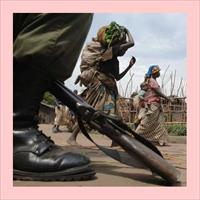Fighting in Democratic Republic of Congo causes humanitarian tragedy

Fighting continues on several fronts in North Kivu in the Democratic Republic of Congo despite a unilateral ceasefire declared by the armed group, the National Congress for the Defense of the People (CNDP), on 29 October. The CNDP's offensive in October forced a routed government army and hundreds of thousands of civilians down roads towards the provincial capital, Goma.
More than 250,000 people have so far fled the ongoing violence, bringing the total number of displaced people in the province to at least 1.2 million and possibly higher. Most are now living in displaced camps in the narrow belt of land that is still under government control around Goma.
"A human rights and humanitarian tragedy is underway in North Kivu province, but the UN Security Council, the European Union and African Union are sitting on their hands," said Andrew Philip, Amnesty International's researcher on Democratic Republic of Congo. "They have so far failed to give the UN peacekeeping force, MONUC, the reinforcements and equipment it needs to provide effective protection to civilians."
Conditions in the camps are said to be disastrous. New camps, many without latrines, potable water and shelters are still springing up. Some camps are within a few hundred metres of the front lines.
Dozens of cases of cholera have begun to be reported. Humanitarian agencies are doing their utmost to bring aid to these displaced, but are close to being overwhelmed by the scale of the suffering.
In the larger part of the province, in areas under armed group control or otherwise inaccessible to humanitarian aid, tens of thousands of displaced are unaccounted for and living without any organized assistance.
The human rights situation is no less deadly. On the night of 5/6 November, after fierce fighting between the CNDP armed group and pro-government mayi-mayi militia for control of the town of Kiwanja, CNDP fighters reportedly went from house to house, searching for mayi-mayi members they believed were hiding inside.
Witnesses told Amnesty International that large numbers of men, residents of Kiwanja, mainly aged between 18 and 30, "young fathers and newly-weds” (“jeunes papas et nouveaux mariés"), were taken from their homes and deliberately killed by the CNDP. Mayi-mayi fighters also reportedly unlawfully killed civilians they suspected of being CNDP supporters in and around Kiwanja.
Seventy-two people have so far been buried in the town, according to reports received by Amnesty International, some apparently killed by crossfire during the fighting, but many others in its aftermath. The bodies bear gunshot and stab wounds.
In Goma, on the night of 29/30 October, at least 18 killings were reported, most apparently victims of armed robbery and looting by government soldiers retreating through the city.
Amnesty International continues to receive daily reports of other war crimes and serious human rights abuses. In Masisi and Rutshuru territories, widespread abductions of children for use as child fighters, as well as rapes and killings of civilians are ongoing.
The crisis has unleashed a wave of high-level diplomatic activity, including a regional African Heads of State summit, chaired by the UN Secretary-General, to address the crisis, and missions by UN and AU Special Envoys as well as by senior US and EU politicians.
"But these diplomatic coming and goings have so far saved not one life; have opened up not one road for much-needed humanitarian aid," said Andrew Philip. "Many governments have expressed support for reinforcing MONUC, but so far the Security Council has not authorized deployment of the additional troops and specialist personnel and equipment MONUC says it needs.
Amnesty International is urging the international community to:
• make no more excuses.
• reinforce MONUC now.
• create safe corridors for humanitarian aid throughout North Kivu.
• put concerted international pressure on the fighting forces to halt all human rights abuses.
See Also
- DR Congo: Action must replace European ‘air-miles’ diplomacy as ceasefire breaks
- NGOs call for UN session on the Democratic Republic of Congo
- UGANDA: Government and rebels extend ceasefire
- DRC: 150,000 children miss school as violence continues in the east
- DRC: Army recaptures villages as Nkunda appeals for new ceasefire
 Back and Next - Back and Next
Back and Next - Back and Next See Also - See Also
See Also - See Also